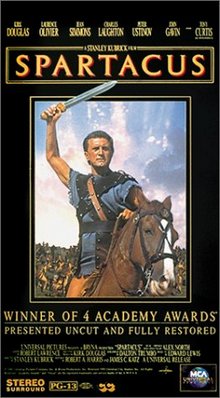| The 1960 epic Spartacus is long and in it’s production and pacing doesn’t fare well when compared to modern films that tell similar stories such as Gladiator or Braveheart, so it might be difficult for younger viewers to appreciate. (Really, when was the last time you saw a movie that took itself so seriously as to have an overture and an intermission?). The movie does explore some key themes, however, that can make for interesting starting points for discussion on the nature of love, power, freedom, hate, sexuality, political intrigue, loyalty, and friendship.
The central theme, however, is man’s desire to live free and with dignity and the willingness to sacrifice all to achieve it. This is shown well in several scenes and with dialog that is powerful and not too preachy or long-winded. While the movie is based on a book by Howard Fast and the screen play was by Dalton Trumbo (both Communists), the movie is not as political as you might expect. While the story is about gladiators and slaves (the proletariat) trying to throw off their masters, I thought the presentation and scenes explaining what Spartacus hoped to achieve were more closely related to the Declaration of Independence than to The Communist Manifesto. Indeed, part of the irony is to consider how much of what Spartacus said and did would have resulted in the same treatment from a Communist government as what he received from the Romans. In addition, the film’s illustration of the dehumanizing aspect of slavery without a racial element may be eye-opening for those who think of slavery as being a black and white issue only. |
 |
Of particular meaning for young men are the scenes that show that self-control is the foundation, and not the opposite, of freedom. First in his initial dealings with the woman Virinia when Spartacus refused to perform sexually for the entertainment of the guards, and in his control over the gladiator army to keep it from behaving like a drunken mob, showed that the power to do something is nowhere near as important as the power to choose not to do that thing.
Finally, the political intrigue is instructive as we watch Crassus and Gracchus manuever and manipulate others to serve their own ends, becoming the personification of two opposing political philosophies willing to mouth anything to gain power when in reality there was little difference between them. One illuminating quote was when Gracchus said, referencing the gods: “Privately I believe in none of them. Neither do you. Publicly I believe in them all.” Also, later in the movie, when Julius Ceasar (then commander of the garrison of Rome) questions Gracchus on the unseemliness of dealing with pirates and criminals and Gracchus replies, “Don’t be so stiff-necked. Politics is a practical profession.”
Points to ponder:
What is the nature of freedom; how do you get it and how do you maintain it.
Questions to answer:
- On two occasions Spartacus draws distinctions between being man and being an animal. What were these occasions, and how did they relate to each other?
- One difference between Crassus and Gracchus is that one saw the people as something to be exploited and the other saw them as something to be controlled. Which was which, and how did they go about trying to achieve their ends? What differences, if any, were there between their objectives?
- At the end of the rebellion, why did the gladiators all claim to be Spartacus, even though it meant death? Was their decision similar to, or different from, Gracchus’ action at the end of the movie? How and why?
Great quote:
Spartacus said, “When just one man says, ‘No, I won’t,’ Rome began to fall.”











